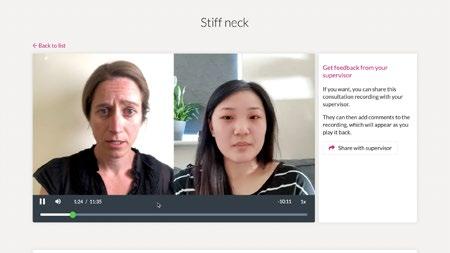
4 minute read
COVID-19: the RCGP response
from GP Frontline: Autumn 2020
by RCGP
Whilst much of the political and media narrative around COVID-19 has been focused on the efforts of ICUs, GPs and their teams have been busy throughout, radically transforming the way they deliver care, and continuing to deliver the vast majority of NHS patient contacts.
The College has responded to support members and their teams in myriad ways, not least in being the ‘voice’ of general practice.
A series of open letters to the Government and political leaders has achieved widespread national media attention on issues such as the need for clarity on PPE use in general practice; for targeted COVID-19 testing at a community level - and for GPs to have access to testing; for action to address the disproportionate way Black, Asian and minority ethnic people have been affected by the
The College has called for support to deliver care to patients with long-Covid, clarity around shielding guidance, and for technological barriers to delivering remote care to be addressed. It has also been at the forefront of making clear that general practice is open - defending the profession against claims to the contrary - and encouraging patients who are concerned about serious health concerns to seek medical care. Crucially, the College campaigned for the temporary suspension of appraisals and practice inspections to enable GPs to focus on frontline patient care.
The College has received more than 17,000 mentions in the media during the pandemic – almost 1000 in national print and broadcast outlets. Martin Marshall has appeared on BBC Radio 4’s influential Today Programme 10 times, as well as BBC’s Newsnight, Sky’s Sophy Ridge on Sunday, and featuring on all other major news broadcast stations.
As well as private and public advocacy on behalf of GPs, the College has produced CPD and education resources to keep GPs up to date in the fast moving landscape of COVID-19 (see p5)- and has been at the forefront of research into the virus through its Research and Surveillance Centre (see p6). A series of #RCGPTogetherLive webinars covering topics such as technology, health inequalities, and relationship-based care, have been viewed by over 4,000 people.
Whilst supporting GPs through the pandemic, the College has also been looking to what the post-pandemic landscape will mean for the profession. General Practice in a Post-Covid World was published in July, featuring on the front page of The Times.
A NEW COLLEGE EXAM IN 10 WEEKS!
The College cancelled the Clinical Skills Assessment and sittings of the Applied Knowledge Test in mid-March following Government guidance – but thousands of trainees were due to CCT during the summer.
The solution was the development of a completely new exam that would appropriately test the clinical expertise of candidates, while keeping them, examiners and patients safe.
The process from concept of the new Recorded Consultation Assessment to delivery was 10 weeks! This included tendering for a provider, design of the assessment, GMC approval and a pilot. pandemic; for strict controlled drug laws to be temporarily relaxed to allow optimal end of life care; for assurances around flu vaccine supplies; and for the cap to be lifted on medical school placements following the A-levels fiasco. These letters have led to tangible change, for example with Health Secretary Matt Hancock singling out the College’s letter as a reason for honouring all offers made to students about to start medical training, based on their predicted grades.

Deaneries identified those who needed to CCT quickest, and candidates submitted over 700,000 minutes of recorded consultations, equalling 11,666 hours and 486 days.
‘Emergency’ sittings for the Applied Knowledge Test were also arranged for July and August, with reduced numbers and social distancing measures in place.
College Chair, Professor Martin Marshall, said: “This was an extraordinary achievement for the College and for our trainees who had to deal with the worry and uncertainty of having their MRCGP cancelled.
"My thanks to Vice Chair of Professional Development Michael Mulholland and Chief Examiner Mei Ling Denney for their incredible leadership, as well as our examiners and staff teams who worked non-stop to enable nearly 2,000 trainees to CCT as planned and provide a much-needed boost to our GP workforce.”
Guiding the way on flu vaccination

General practice has an excellent track record of achieving high uptake rates of the influenza vaccine every winter. This year, to help minimise the impact of a second wave of COVID-19, the vaccination programme has been expanded to include 50-64-year-olds and Year 11 children.
The College has drawn on military experience to develop guidance on how to deliver the flu vaccine successfully at this scale while considering social distancing as part of infection control measures. It explores alternative locations for flu clinics, equipment needs, and how to implement appropriate safety measures to protect staff and patients from and minimise the spread of COVID-19. The College has also been lobbying government for assurances that there is enough supply of vaccines for the expanded cohort of patients – and if not, for guidance for GPs on who to prioritise outside of at-risk groups.










